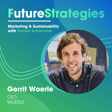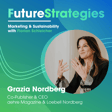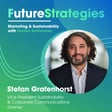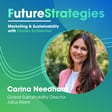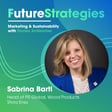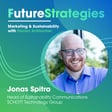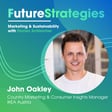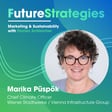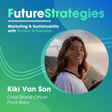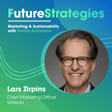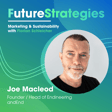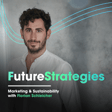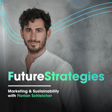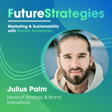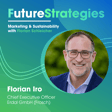Setting Achievable Sustainability Goals
00:00:00
Speaker
I think a very good path is to set smaller goals, like not so far away in the future, to really say, okay, what do we want to achieve by 2025 and then by 2030? So it's really like binding because the time horizon is much, much closer. So if you want to go on a voyage of a thousand miles, you also start with the first step. And I think sustainability is not a switch which you press and then you're like perfect from one day to the other.
Introduction to Future Strategies Podcast
00:00:26
Speaker
Hello, and welcome to Future Strategies. I'm your host, Florian Schleicher. You want your marketing to achieve goals and sustainable growth? You have come to the right place. In this podcast, I talk with marketing experts and share my own know-how on how to bring your marketing to the next level with a lot of inspiration and learnings, all without the usual hustle. So let's jump right into it.
Guest Introduction: Klimens Meyer
00:00:54
Speaker
Today, you are listening to a very interesting episode as I'm talking with Klimens Meyer, who is an expert in the field of digital marketing and sustainability. He's a lecturer at multiple universities, and he founded the platform, Good Cause, or gutt.sek.net. That provides millions of people news and tips regarding sustainability and social topics. Welcome to Future Strategies, Klimens.
00:01:22
Speaker
Thanks for having me. So Klemens, I'd like to start with guttotsk.
Founding of Good Cause Platform
00:01:26
Speaker
Maybe you can give our listeners a bit more of an impression what the platform is that you've created, how it also translates to English and how you also came up with this idea to start it. Yeah.
00:01:37
Speaker
So first of all, Guten Zweck for the English listeners means good cause in German and I found the platform in 2017. I have a background in online marketing and I always wondered why there are so many jobs. Some call it bullshit jobs where you work a lot, but at the end of the day, you ask yourself, what did I do?
00:01:57
Speaker
And what value did I provide to the world? And yeah, I always wanted to have an impact with my knowledge or with what I'm good at. And so I found it in the platform and it started out very, very in a simple way with a blog and social media channels where we tried to give tips and advice to everyone who's interested in implementing sustainable lifestyle.
00:02:21
Speaker
And how has it evolved since then? Because now it's big. You told me it has like a million people each year read on good cause. Yeah. Yes. It's right. Actually at the moment we reach with our, with our topics and more than 2 million people per year and they're still growing. Um, yeah, it started very, very small and basic. I stopped going to holidays for five years and worked 80 hours a week constantly. So it was very, very tough.
00:02:51
Speaker
But it was really the beginning, you're very passionate about it, of course. It's like every startup founder, every project in the beginning, you're extremely passionate. And then there comes, yeah, some call it
00:03:03
Speaker
a desert where you're in it for quite a long time. And then it really separates if you have to drive to continue or you don't. And yeah, the first two or three years, it was really just a hobby project, you could say.
Growth Influenced by Media and Movements
00:03:18
Speaker
And then due to some other effects, like we found it in 2017 and from 2018 on,
00:03:25
Speaker
Greta Thunberg started Fridays for Future and the topic of sustainability also climates became much more popular also in the media and of course these trends helped us as well because when we started in 2017 everyone said okay sustainability social topics
00:03:41
Speaker
Yeah, it's nice, but who needs it, you could say. And then the topic became bigger and bigger. And this also helped us grow our audience, of course. And yeah, from 2019-20 on, we started to professionalize our platform. So we started a media kit.
00:03:59
Speaker
and approached companies if they want to present themselves on our platform. It's also the way we finance ourselves through advertising. So if a company does something for a sustainable future, also support social causes and wants to reach this target group, this audience. So now you have mentioned already a couple of times the magic word sustainability.
Defining Sustainability and EU Regulations
00:04:21
Speaker
And you and I, we talked in the previous meeting we had also about what does sustainability even mean? There is no overall definition of it.
00:04:29
Speaker
What does sustainability mean to you and to your business? Yeah, that's a very good topic you're talking about. And actually at the moment in the EU, there's also regulation in debate called green claims, which addresses exactly this topic because a lot of companies say they are green, they think about sustainability and no one has a clear definition what it means. So the aim of this regulation is also to become more specific about it.
00:04:57
Speaker
and companies who claim that they are sustainable and they aren't will also get fined, which I think is a very, very good thing.
00:05:05
Speaker
because the consumers at the moment have no idea what it really means, and it's like a wild west. And of course, when you ask about sustainability and you ask 10 people, you probably get 10 different answers. A lot of people think about climate, which is also a very big challenge of our times, but there are many, many more topics you could think about, like biodiversity. Yeah, also social topics, and like your own employees,
00:05:33
Speaker
engaging with minorities, diversity and so on. So if you think about these three dimensions, of course, a company has to work in an economic way, but also sustainability, like ecological projects and also social stuff.
00:05:48
Speaker
So I always call it the three P's. It's profit, people and planet. And those three have to come together.
The Three P's of Sustainability
00:05:55
Speaker
And what we've seen in the last couple of years is everybody was just focused on profit. And then if there was some leftovers, they were put into people and the planet. Yeah, of course. And it's like maximizing the shareholder value of us.
00:06:08
Speaker
Yeah, it was very important for a long time, but I think now due to the regulations and also the public, which is more interested about the why of a company. I think a lot of the listeners are also familiar with the concept of start with why by Simon Sinek, which is very famous. I'm a huge fan. Yeah, it's really, really great because a lot of companies have no answer to this simple question you could say. Yeah.
00:06:33
Speaker
but still it's very important to define the why. So then let's jump right into that. What's the why of your platform?
00:06:40
Speaker
Thought that you didn't ask that. We defined the why in very detail, but if you want to make it short, our aim is to provide valuable information for people who are interested in sustainability and social topics and also offer a digital stage for companies who want to present themselves and also want to inspire other people with what they do.
00:07:05
Speaker
Cool. I like that. Yeah. So, and one more thing is you mentioned that a lot of your revenue comes from advertising on a platform. How do you choose advertising partners? Are there also like, so to say bad companies and by bad, I mean companies, because of course we need to move away from black and white definitions of who is a good company and the bad companies, but
00:07:30
Speaker
Are you open to advertise for everybody and anyone, or do you have also criteria on who you want as advertising partners? Yeah, that's a very good question. And we get, as you can imagine, we get asked quite a lot of times how we choose our partners.
00:07:46
Speaker
We also thought about this in detail, of course, because especially when you work in the field of sustainability, being authentic is extremely important. Other platforms decided to go about it in a way that they give out forms or surveys, which the partners have to fill out. And there are different questions. And if you get more than 80 out of 100 points, for example, then the company is sustainable, something like that.
00:08:13
Speaker
We decided against that because every time you want to cluster the field of sustainability, you're biased because there are always weights and definitions you put out yourself. For example, there are companies who do a lot in the sustainability area, like ecological projects, but on the other hand, in social topics, they're very weak or the other way around.
00:08:36
Speaker
Yeah. So we do really a screening based on a company. So we start off with Google, we take a look at if there are some big green washing scandals, of course, the different industries we wouldn't work with. Yeah. Of course, if it's like a weapon company and it wouldn't work out, that's for sure. Yeah.
00:08:57
Speaker
Do what they want but the business model isn't sustainable at all so it doesn't work but we also take a look at if the company really wants to change something want to give an example one of our clients works in the fields of concrete so it's a very large concrete producer which also emits a lot of co2 that's clear.
00:09:17
Speaker
But a lot of people would say, yeah, we don't have to use concrete anymore. I think it's naive because it's like a basic product we have to use. And they are putting a lot of money into research, how to make concrete more sustainable. And they also have different technologies where they can save up to 50% of the CO2 they produce, which is a lot. Because I always say, if you're a startup and you ride bicycles and plant trees, it's easy to say that you're sustainable.
00:09:43
Speaker
But if you're a big industrial company, then you have also a lot of room for improvement. And so that's why also we give the platform also to this
Industry Challenges in Sustainability
00:09:53
Speaker
company because they're innovating a lot and putting a lot of money and brainpower into it. So that's, we also want to show best practice examples, also in different industries.
00:10:05
Speaker
And last but not least, how we secure the authenticity is in our terms of service, we've also written that if there's like a scandal we couldn't have known beforehand, that we can stop any cooperation immediately and delete the company from our platform. That's also very important for us because of course, as I said, you never know what happens. And of course,
00:10:28
Speaker
You can't walk into every company and everyone's head beforehand and we try to filter it out as good as we can but of course you cannot be sure 100% of the times and that's the way we go about it. That's very interesting that you're working with the cement company because like floor ceiling is as we know the worst when it comes to CO2 impact.
00:10:51
Speaker
But on the other hand, as you say, if a company then looks into new solutions, then there can be some big changes applied here and it has a massive effect also. Can I add one more thing? Because we talked about it floor sealing. We interviewed the CEO of Austria from this company on our blog. And even though it was a paid article, we also asked him what his statement is regarding floor sealing. That's also very important for us because a lot of other platforms when they get like
00:11:19
Speaker
paid partners or advertising, they always try to present them in the best way possible and say they're the leading experts in this field and they're the best company. And of course, there's also one thing we try to address that, of course, to do a lot of good things, but they're also aware that there are a lot of things they have to work on and there are a lot of problems. So we try to be as direct and authentic as possible and also talk about the pain points, even though it's a paid article and it's very important to us.
00:11:48
Speaker
For our listeners,
Greenwashing in Business Practices
00:11:49
Speaker
what's happening with greenwashing is that more and more corporations and players are using false claims or use wrong compensation payments in order to trick consumers to make them appeal more green, more sustainable, to just continue making profits with old business models. So I was curious, why do you think
00:12:11
Speaker
that we tend to have more greenwashing now than in the past. Do you think it's because we look more closely or because more companies have seen that there is some profit to be made here with more people also asking for a sustainable solution? So what's your take on that?
00:12:26
Speaker
Yeah, I think it's a bit of both, but mainly that more people take a look or it's more important to more people that the solutions are sustainable. And of course, if a company knows that, that they can greenwash their image or sell more products, that they try to present it or their products in a better way, or sometimes even
00:12:48
Speaker
better than they are, really. So yeah, I think it's a bit of both, but most of the time, it's really the latter. So companies have noticed that the public opinion has shifted to more sustainable products. You also have to say it's not like that all around the world. Like, for example, a friend of mine was in India a few months ago, and they really have other problems and a lot of more poverty. So it's also a topic which isn't
00:13:14
Speaker
They are on a global scale, but I think if you live in a country which is wealthy, you also have the privilege, also the obligation to think about this stuff. And are there any examples of greenwashing that you have seen in the last months that you think were very preposterous or shocking for you also?
00:13:36
Speaker
Yeah, there are a lot of examples. I mean, like a few days ago in the media, there was this article about Awa. Yeah, the Austrian Airlines. Austrian Airlines, yeah, which said they could fly like CO2 neutral, which was of course not true. They said they have sustainable aviation fuels. Yeah. Yeah. And they also got fined for his claim because it was not true. A lot of other examples, which a lot of people don't know about, for example, a lot of companies
00:14:05
Speaker
try to do reforestation or plant trees and claim that they can reduce their CO2 emissions. And a lot of people don't know that this is actually not true because
00:14:16
Speaker
The trees in the countries, for example, in Austria and Germany, they're going into the CO2 budget of the country itself. So like Austria says, we have so many forests and you cannot claim the forest two times. So the CO2 budget is already, forests are already implemented in the CO2 budget of the country, but still a lot of companies forest trees and say,
00:14:42
Speaker
it reduces their own CO2 level. So that's also a kind of greenwashing. That and also like if I plant a tree now, it takes 30 to 50 years until that planted tree can then filter out CO2 of the atmosphere. So it's just, it doesn't have a direct impact.
00:15:01
Speaker
And I also want to go a little bit deeper on the example of the airline that you mentioned, because I talked to the lawyer who was working on that case in Austria. And the interesting thing was that the airline said they were advertising they have sustainable aviation fuels. And what happens there is that they mix some old food oil.
00:15:24
Speaker
into the gas mix. And what actually happened was that there was 0.4% of these oils in the kerosene for the airplane. So if you label something as sustainable and then you have an impact of 0.4%, I think that's just ridiculous. And it shows that there are a lot of companies that want to use this because they see there is so much potential and people want it. And I think on the other hand, we also see that consumers
00:15:53
Speaker
They want to see companies make progress. And then they are fooled and tricked by that. And also the same with the trees. On the first level, it sounds great that a company says, hey, we're planting a million trees. But then you would have to think about it. And I think the problem is that people usually don't have the capacity in their lives because they are so busy and they have other problems, as you also said, in other countries that they can't really question everything that's happening. So you also mentioned at the beginning the Green Claims Initiative.
00:16:23
Speaker
So let's dive a little bit deeper into that. So what is the EU proposing with that and what effects do you think it will have on companies' behavior also?
EU Green Claims Initiative
00:16:33
Speaker
Yeah, sure. First of all, one thing I want to add regarding planting trees, you're absolutely right that planting trees today is a promise for the future. You have to see if the tree is really growing, if there are natural causes which cause the trees to be damaged or something. But there are also, I think, a lot of projects who try to do it in a good way, like Ecosia.
00:16:53
Speaker
I've heard about it, of course, it's sustainable search engine. It works like Google, but the profits go to planting trees and they also try to monitor if the trees really grow. So I think it depends a lot of how you do it and if you do it in a professional way. But I'm just, I want to add this one more point.
00:17:13
Speaker
And regarding the Green Claims Initiative by the EU, it's still up for debates and I'm also very curious how the EU defines what is sustainable and what is not. So this is currently something I'm watching and I'm curious. I heard I talked to some experts that some things will come out in 2024. And until it's like a national regulation, it will take like one or two more years, I guess.
00:17:39
Speaker
And also the fines, that's also up for debates, but a lot of people propose that the fines should be like the fines in the GDPR, so up to 4% of daily revenue. And of course, this would be a good signal, I think, for the companies, but also for the consumers. And interesting because I talked to some companies who are really leading sustainability, you could say in Austria, also at the Trigos Award, which I attended some days ago.
00:18:07
Speaker
And what was really interesting is that they said they're really CO2 neutral and they try to do everything about it, but it's, it's also depends on the definition. So does CO2 neutral mean to where they produce the products or does it mean the complete supply chain? So that's also something which has to be defined because right now it's like Wild West, everyone can claim whatever, whatever they want.
00:18:31
Speaker
And I think because we talked a little bit about greenwashing and examples and my like worst of the worst example because it worked so well was this campaign by Ogilvie and BP. So in the 2000s, they began to.
00:18:47
Speaker
push for this thing called personal CO2 footprint. So they began with a series of interviews where they asked regular people, do you know what your personal footprint is? And I think why it was so dangerous and it still is because it shifted the responsibility away from an oil company, BP,
00:19:07
Speaker
which then also tried to rebrand itself to beyond petroleum instead of British petroleum. That's another story. But still today we have footprint calculators, personal footprint calculators, when we know that the individual impact is something very different than the impact that a company can make.
00:19:25
Speaker
Yeah, I think it's one of the most successful green washing campaigns.
BP's Personal CO2 Footprint Campaign
00:19:29
Speaker
You could say that they developed this CO2 footprint calculator. And I think a lot of people know it and a lot of organizations have adopted it. Yeah. Like the climate ministry in Austria or the WWF. And there are a lot of websites which offer this tool and per se it's a good thing because of course everyone can make a change, but the impact a single person has on the climate is.
00:19:53
Speaker
so natural and so small, in comparison to the real industrial companies, that it shifts their attention. And that's also the goal of the advertising agency, Ogilvie and Mehta and NPP. And it worked out perfectly.
00:20:10
Speaker
And a lot of people don't know it because a lot of people, I asked, where does this calculator come from? They say, okay, was it developed by the United Nations or by another organization? But yeah, most of the people don't know it originally comes from an oil company.
00:20:28
Speaker
And I think another interesting example, because you mentioned the Green Claims Initiative from the EU, and another thing that's coming is these European Sustainable Reporting Standards, or ESRS, where large corporations will have to apply the standards already in 2024, and many small and medium enterprises will also have to report their emissions in 2026. Does that outlook excite you, or do you think there will be also loopholes in there?
00:20:56
Speaker
I think there will always, where there are regulations, there will always be loopholes. And we've seen companies are extremely creative about trying to use those loopholes, but I think they will be fixed as soon as the EU finds out what loopholes there are and how they're used. But I think a lot of companies also say it's
00:21:15
Speaker
a huge administrational obligation that they're facing. And it's true. But on the other side, I think, especially when it's about such an important topic like climate, that there should be much stricter regulations. And a lot of companies also don't realize that it affects a lot of different sectors. Like when you think about ESG, when a company tries to get a loan or money from the bank,
00:21:40
Speaker
In the future, it will be much stricter that there are forms that have to fill out what the ecological impact on the environment is. And if they're not satisfying these needs, then they won't get money. And this will get stricter from year to year.
00:21:57
Speaker
So I think I always say like the sustainability field is like maths in school.
Youth Influence on Business Sustainability
00:22:03
Speaker
Yeah. There are some people who are really nerds and push themselves and say, yeah, I'm totally in it. And a lot of companies say, okay, we know we have to do it and we try to wiggle our way through.
00:22:13
Speaker
And I think it's the same sustainability, but I guess it will become more and more clear. And also like the generation shift, because when you think about who are the CEOs today, they're like mostly 40, 50, 60 years old. And when you're thinking to the future in 20, 30 years, the people that are young now will be the new CEOs. So I think this also helps.
00:22:34
Speaker
To drive this change, of course, we should act today, not tomorrow. That's clear. But I think the regulations help to take actions today and hopefully and more and more intrinsically motivated CEOs will come up in the future as well. Yeah, I hope so too. But just this week I had a conversation about sustainability reports with a researcher.
00:22:54
Speaker
Mirya Kempepläger and she wrote her PhD thesis about sustainability reports and she analyzed the reports of a lot of companies and what she found was that a lot of companies are quite bold in saying what they plan to do and what their future sustainability strategy is but they then have a small disclaimer
00:23:15
Speaker
where they say that all these plans and strategies are legally non-binding and it's things they are thinking about. So it's again, a lot of empty talk. So my question now is how can we get from what we have at the moment as a lot of talk and no action, how can we get companies and also marketing departments to push for real changes before talking so boldly about it?
00:23:43
Speaker
Yeah, I think a lot of companies fall into this trap. And also one thing I highly advise to anyone who is working with like Utudvac or with me is always to like over-deliver. Because a lot of companies say we want to be climate neutral by 2030 or 40 or something like that. But they don't deliver because they say, okay, this is like 10, 20 years away.
00:24:10
Speaker
And who knows what happens until then. So I think a very good path is to set smaller goals, not so far away in the future, to really say, OK, what do we want to achieve by 2025 and then by 2030? So it's really binding because the time horizon is much, much closer. So if you want to go on a voyage of 1,000 miles, you also start with the first step. And I think sustainability is not a switch which you press, and then you're perfect from one day to the other.
00:24:40
Speaker
a lot of small steps and incremental improvements you have to make. And I think a lot of companies who really take this serious, really start out with this approach. And I think it's much more relevant than claiming some things, which you can see the footnotes, which states it's not binding and so on. I think what we need is, as you said, real progress, real changes. And those are often tough changes.
00:25:08
Speaker
One last example that I would like to talk with you about is Apple. So probably you've seen this Mother Nature spot. The concept is that Mother Nature appears in one of Apple's board meetings and she keeps asking them on the progress they're making. And she's rather cynical. She says, okay, so
00:25:27
Speaker
You were doing a little step here and a little step there. And then the board answers to her and also the system data manager and also Tim Cook is in the spot and he says, yes, we're doing things and we will phase out plastic in our packaging. And then she says, and yes, so when are you doing that 2030, 2040? And he says, next year.
00:25:46
Speaker
So what I really liked about that and Apple is in by no means perfect, but what I liked about it, it was authentic because they were saying Oz in a spot. We know we're not perfect, but we're doing things. We're doing them boldly.
00:26:01
Speaker
We will provide some accountability because we're now talking on a big stage about it and people will recognize it. And also, I think it drives the industry. I've seen a statistic where it shows which smartphone is the most sustainable. And let's be clear, no smartphone is sustainable. But the most sustainable is Fairphone.
00:26:25
Speaker
And then after that, it's the iPhone, actually. So I don't want to fall into an Apple Pro speech here, being a fanboy myself, but I think it really shifts the attention of everybody. If a global brand like Apple gives sustainability such a big stage where they can talk about it. So I was asking if maybe the thing that we need is coming also back to your platform to create more stages
00:26:53
Speaker
where good companies can talk about what they are doing to inspire others to also take action. Yeah, you're absolutely right. I think also, as you explained, the campaign by Apple, it sounds like a very creative one, as you could imagine, like Apple coming up with creative ideas. Because as I've heard it, Mother Nature is also presented as a person or as a stakeholder of the company.
00:27:19
Speaker
And I think that's a very good way to put it and regarding your topic about putting out best practice examples. Also that's something we want to address and we started a new format for it on our platform actually. So, so far we had like blog articles, social media campaigns and so on. And we also started a tab, which is called organizations. So it's like a search engine where we released organizations.
00:27:44
Speaker
And people can filter them by industry, by number of employees and so on. And the aim is to have as many companies as possible listed on our platform for interested competitors who can take a look and see, okay, what is this company doing and what could we like implement for ourselves as well.
00:28:03
Speaker
But also for interested audience or a lot of young people also want to have a job which provides value, not only money. So they can take a look as well and see, okay, I want to work in this industry and in a startup or in a large company. And what are they actually doing regarding sustainability and social topics? So that's something we try to build up more and more because we think that these profiles of the organizations can also provide some value to competitors, but also to interested audience.
00:28:31
Speaker
And when it comes to profiles, maybe one last question, because I also want to talk to you about the final three questions, is when you're talking about rankings also and displaying this, what's your take on B Corp? And can you, for the listeners who don't know it, maybe give a short rundown of what B Corp is?
00:28:49
Speaker
Yeah, sure. To be honest, I didn't have a deep dive. I've heard about B Corp, of course, it's like certification for companies, which states that the company is sustainable. And it's very, very widely spread and known. What I've heard and what I didn't like so much about it, that the fees are actually quite high. I also heard that the fees, I don't know the exact
00:29:12
Speaker
numbers but they started a few hundred euros up to I think 50,000 for really large organizations and I think it's also an interesting business model from this perspective because of course when your label becomes so widely known and you get a yearly fee then a lot of companies and you have a lot of companies also you make a lot of revenue.
00:29:33
Speaker
And one thing I would, would say, I don't, I can't say it for PCORP for sure, but also for other labels. For example, in Austria, there was a, quite a big scandal regarding AmaKutasegal. So it's like a label from meat products that you're, you're in danger. If you get like a yearly fee from the companies that you lower the bar because you want of course more companies to get the label. So I don't know. I don't want to say this about PCORP and don't know enough about it to say that, but this danger exists if you're,
00:30:02
Speaker
if a revenue is linked to how many companies you've listed there. So of course it's like a very well-known label, but I don't know enough about it to really have a comment which is profound, I would say. But still, thanks very much. So let's shift to the final questions, which I ask everybody who comes on this show. And let's start with the first one. What makes good marketing for you in three words?
00:30:30
Speaker
Okay, if I only can use three words, I would say, first of all, creativity, like, yeah, being creative about the ads. For example, we talked about Apple and other other companies as well. Secondly, also the analytics. So it's probably the opposite. So most people are either creative or very like analytical, but I think in marketing, you need both sides also to see if the ads really performs well or it's received well.
00:30:56
Speaker
And I think the third part is no big surprise, but being authentic and especially in the field of sustainability, but also of course in other fields. I think if you have these three parts, then you're set up in a good way to have a great marketing. Great. Yeah, thanks. Second question, what is the future of marketing?
00:31:18
Speaker
Yeah, there are a lot of changes ahead of us. I can only, because I work in the field of online marketing, I can primarily comment on that. One thing that we're seeing and also having a lot of discussions with my colleagues is of course, AI is a big factor when you think about mid-journey image generation also, chat GPT and so on.
00:31:40
Speaker
And I've seen a video on YouTube where there was an audience of a few hundred people and the guy on stage asked who is using chat GPT. And I think 95% of the people stood up. So it was quite, quite interesting. And of course the adaption will, will take a little bit of time until it's so widely known that it's really a threat to Google. But one possibility for sure is that in the future,
00:32:08
Speaker
more people will use large language models like chat GPT and therefore Google and also search engine optimization. So things you do for your website to rank Google and Google will become less important. And another factor is also that companies will struggle to get traffic to the websites because now you Google something and the companies that are first
00:32:33
Speaker
view in the Google search, I will get clicks to the website because people have to get some information. But if you get the information directly from chat GPT, which crawls or goes through these websites by itself, then more and more websites will struggle to get traffic.
00:32:49
Speaker
And yeah, whether it's important for them to get the traffic, they will have to be creative to find some ways to do so. But on the other side, I think also social media will get more and more important because the people are on social media platforms. So I think a big and authentic community and getting into the dialogue with your target audience will become more and more valuable in the future as well.
00:33:15
Speaker
So I think these are the biggest changes I see for the next years.
AI's Role in Marketing Evolution
00:33:21
Speaker
But of course, I'm no magician, and I don't know by myself exactly, but there are some trends ahead of us for sure. Yeah, I like that. And I think AI will have a big impact. And I'm very curious which system will prove the most successful with it right now. We have a lot of platforms. A lot more will come. And we also see that a lot of big companies are in shopping spree right now buying stuff. So I think there will be quite some changes in the upcoming years. Of course, yeah.
00:33:49
Speaker
Final question, Clemens. What book have you read recently that you want to recommend here? For book recommendations, I think in general I have to make a statement. I think the best book is always the one that helps the problem you're facing. So if you want to have a problem with, I don't know, coding or with self-development or whatever it is, the best book for you is the one that solves the problem ahead of you.
00:34:12
Speaker
I read quite a lot of books, also like biographies or different books regarding marketing most of the time. And one book that really, really stood out for me, it has a really sketchy title, but the content delivers, I can tell you for sure. It's called The Millionaire Fastlane by MJ DiMarco.
00:34:30
Speaker
I don't know if you heard about it. You should definitely read it because especially for people who are in the field of online marketing or have online companies, it really lines out the factors you have to face to be successful. And one of the statements very interesting is a lot of people chase money. So they say, I want to become rich for whatever reason.
00:34:53
Speaker
I think being rich is not bad, but it depends on your motivation. If you become rich just to prove to your neighbor that you have a bigger car, it's absolutely stupid. They are a bigger house. But if you use this influence, you have to do something good. I think it's a very, very powerful thing to do.
00:35:08
Speaker
And yeah, most of the people chase the money, but hardly anyone chases value. So a lot of people say they want to become rich, but no one says, how can I provide value to the world? Yeah. So you hardly hear it everywhere. And a lot of also other different concepts that are very interesting. So the title may sound a little bit sketchy, but I can promise you the content is very interesting. Okay. Then we'll go to my reading list. Thanks a lot for your recommendation. Should definitely be so. Yeah.
00:35:37
Speaker
So Clemens, thank you very much for coming on the show. It was really a pleasure talking with another sustainability expert. And I really like what you're doing with your platform and I hope more people will get their tips regarding sustainability and social topics from you. So thanks for taking the time and I already look forward to our next conversation. Thanks for having me. Bye.
00:35:59
Speaker
And that's it for today's episode. Thank you for listening. And now I have a question for you. Are you curious how your marketing can achieve sustainable growth? Then I have some simple and exciting options for you. First, this is exactly what I do for my clients. I help them build their future strategy with workshops and sparring sessions.
00:36:22
Speaker
I also have a very simple entry offer for founders and aspiring marketing experts, the Simple and Sustainable Marketing Academy, with a ridiculously cheap entry ticket price, because I love sharing what I've learned. Lastly, if you enjoy reading, check out my newsletter, where I write about marketing, strategies and sustainability, for over a thousand bright and curious minds.
00:36:47
Speaker
you can find all the info in the show notes. And if you have any feedback on this episode, I'd love to hear it. Please give me a rating wherever you listen, if you like it, or reach out to me directly. So until next time on Future Strategies.

